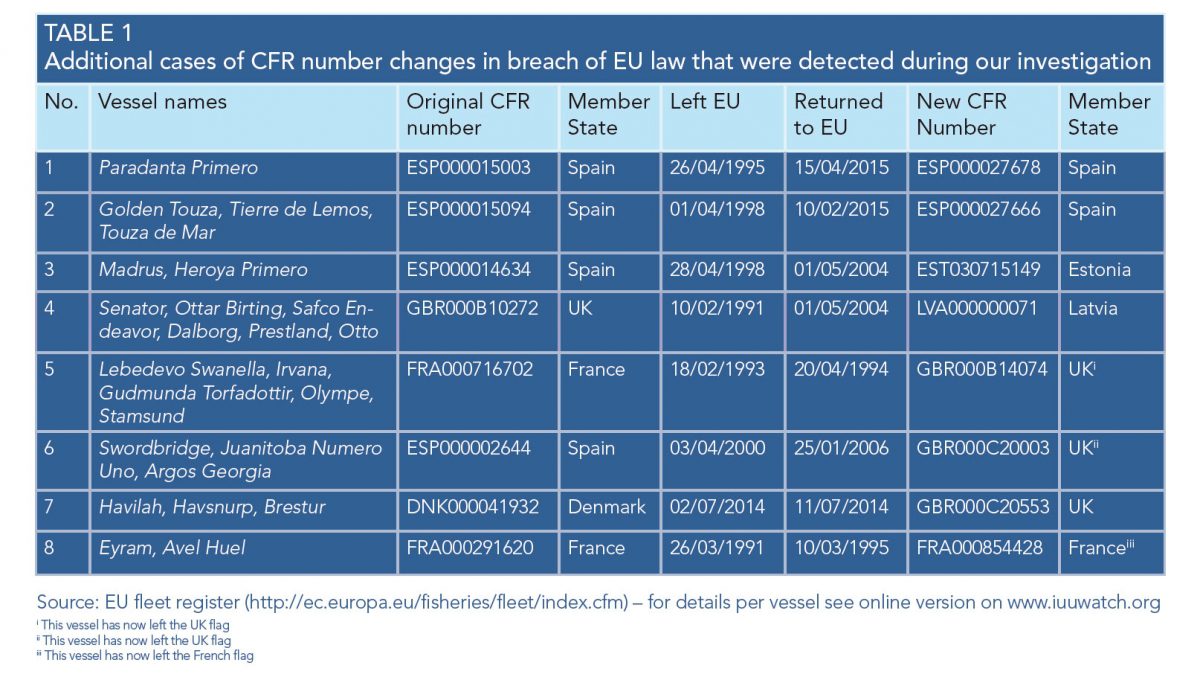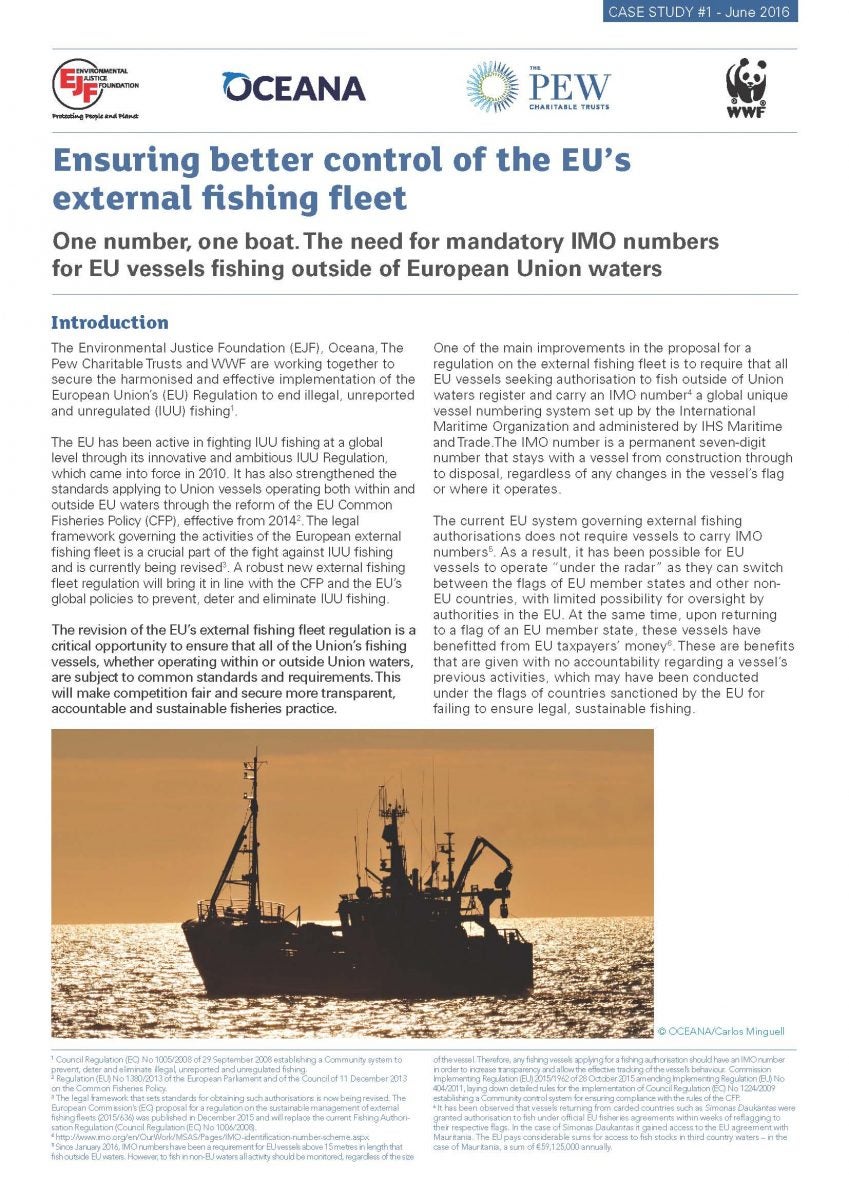July 12, 2016
Why global unique vessel identifiers are needed – unveiling cases of EU vessel number changes in breach of EU law
One of the priorities of the European Union (EU)’s reformed Common Fisheries Policy (CFP) is to ensure sustainable fisheries both in European waters and on a global scale. The EU has in the past decade introduced new, tighter laws to achieve legal and sustainable world fisheries at a time of mounting threats to marine biodiversity and food security. It has also committed to stop so-called ‘illegal, unreported and unregulated’ (IUU) fishing, through its world-leading EU IUU Regulation, which entered into force in 2010.
In line with these developments, the EU is currently taking a serious step forward towards improving the sustainability and transparency of the activities of its fishing fleet outside EU waters with its recent proposal for a regulation on the sustainable management of the external fishing fleet. An essential provision of the proposal is to require EU vessels to have a global unique vessel identifier (or “UVI”) before they can fish in non-EU waters. If included in the final regulation, this measure would allow vessels to be tracked globally, not just at the EU level.
An investigation carried out by Oceana and its partners has revealed multiple cases where the lack of a UVI has allowed EU vessels, which are able to benefit from lucrative EU fishing arrangements in external waters, to evade proper transparency and scrutiny of their activities by flouting the current system for identifying EU vessels.

How is the current EU vessel identification system flawed?
A fishing vessel may change its name several times during its fishing history under the EU or another country’s flag. This single fact makes the “name” an unreliable parameter to follow up on a fishing vessel’s history.
Currently, to obtain an authorisation to fish in non-EU waters, vessels need to have a European unique vessel identifier – called a Community Fleet Register (CFR) number. However, this number applies only to EU vessels and is not used outside the EU, i.e. during any periods that a vessel operates under non-EU flag. When a vessel that was previously in the EU register wants to re-enter the EU flag, its historic CFR code should be used. However, in certain cases, new CFR numbers have been generated for vessels that were previously in the EU register (see our case study for more information). This makes it impossible to identify any illegal behavior or activity of a vessel during previous periods in the EU fleet register, i.e. prior to flagging to a non-EU country.
 As a result, it has been possible for EU vessels to operate ‘under the radar’ as they switch between the flags of EU member states and non-EU countries, with limited possibility for oversight by authorities in the EU. Our investigation has shown that at least nine vessels have been able to obtain new CFR numbers in breach of EU law since the EU fleet register was established. In the case of the Simonas Dakauntas, the vessel re-entered an EU flag from the Belizean flag and was given a new CFR number upon its return to the EU register. At the time, Belize had been warned (yellow-carded) by the European Commission for failing to fight IUU fishing and to exercise effective control over vessels registered to its flag.
As a result, it has been possible for EU vessels to operate ‘under the radar’ as they switch between the flags of EU member states and non-EU countries, with limited possibility for oversight by authorities in the EU. Our investigation has shown that at least nine vessels have been able to obtain new CFR numbers in breach of EU law since the EU fleet register was established. In the case of the Simonas Dakauntas, the vessel re-entered an EU flag from the Belizean flag and was given a new CFR number upon its return to the EU register. At the time, Belize had been warned (yellow-carded) by the European Commission for failing to fight IUU fishing and to exercise effective control over vessels registered to its flag.
Although the Simonas Dakauntas was entering the EU fleet register from a yellow-carded country, the Polish and, subsequently, Lithuanian authorities granted the vessel authorisation to fish under an official EU fisheries agreement with Mauritania, within weeks of re-flagging to their respective flags. Under the current legal framework, to obtain an authorisation to fish in non-EU waters, EU vessels are not required to provide proof of their compliance with applicable conservation and fisheries management rules while operating under a non-EU flag. This is a significant gap in the system that undermines the ability of the EU to guarantee that only vessels that adhere to international fisheries laws are allowed to operate under a member state flag in non-EU waters.
What should change to ensure that EU vessels can be monitored properly?
The current EU system does not require vessels to carry a global unique vessel identifier issued by the International Maritime Organisation – called an IMO number. The IMO number is permanent and stays with a vessel from construction through to disposal, regardless of any changes in flag or vessel name. It is therefore the most reliable and effective way of monitoring the compliance of a vessel with applicable laws and tracking its history. The new external fleet regulation should require that all vessels applying for an authorisation to fish in non-EU waters have an IMO number.
See additional cases of CFR number changes in breach of EU law that were detected during our investigation on WhoFishesFar.org


